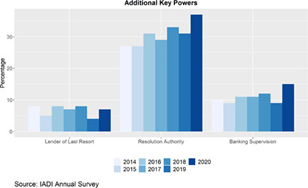However, nearly 10 years after the enactment of the Law, during its implementation, besides achievements, there remain some problems and shortcomings to be solved.
Mr. Ta Quang Don - Director of the Legal Department of the State Bank of Vietnam (SBV) said that the Law on DI has created the legal basis for deposit insurance activities. However, besides achievements, there are still some obstacles and inadequacies in the law implementation process. Among them, Mr. Ta Quang Don pointed out the 03 following problems and inadequacies of the Law:
Firstly, some provisions in the Law on DI are not specific, resulting in difficulties in the implementation of the Law.
Specifically, the Law on DI stipulates that insurable deposits consist of term deposits, demand deposits, savings deposits, certificates of deposit, promissory notes, bills of exchange and other forms of deposit according to the Law on Credit Institutions. However, in the documents guiding the implementation of the Law, there are no clear stipulations concerning "other forms of deposit", so there are different views on whether or not security deposits, prepaid cards... are insurable deposits.
The Law on DI does not provide procedures for amending, supplementing, and re-granting the Certificate of DI participation when an insured institution changes information about the Certificate of DI participation or when the deposit insurer changes the form of the Certificate of DI participation. In fact, such cases have arisen, so there should be specific regulations and guidance on this issue in the Law.
Regarding the assessment and payment of DI premiums, some insured institutions have encountered difficulties in operation leading to late payment of DI premiums, arrears of DI premiums or fines for late payment of DI premiums and inability to pay DI premiums. However, there are no regulations on the arrears of DI premiums, the extension of the deadline for DI premium payment, the handling of the insured institution's DI premium arrears up to the time when the insurance payment obligation arises. In addition, the Law on DI does not stipulate the first-quarter DI premium assessment period for those compulsory DI members, which have operated for a while before applying for Certificates of DI participation, thus resulting in various interpretations of the timing of the first premium collection period.
Secondly, some provisions in the Law on DI need to be re-considered to suit the current situations and legal system.
Specifically, the application of a differential DI premium system is in line with the trend of increasing competition, creates fairness for insured institutions, and encourages them to operate healthily to enjoy lower DI premium rates.
However, the application of a differential DI premium system also presents difficulties. The system of credit institutions in Vietnam is still in the process of restructuring, with a focus on fundamentally and thoroughly dealing with bad debts and weak credit institutions. The application of differential DI premiums will increase a financial burden on insured institutions, especially high-risk credit institutions, and increase difficulties for the restructuring and bad debt settlement of these institutions. According to the Law on amendments and supplements to a number of articles of the Law on Credit Institutions, credit institutions placed under special control are exempt from paying DI premiums.
Currently, there are 61 (60%) out of 102 deposit insurers in the world that still apply flat-rate DI premiums, including Japan and Korea. The Law on DI does lay the foundation for applying a differential premium system. However, Vietnam has still been applying a flat rate of 0.15% on the average balance of all insured deposits at each insured institution. The application of the flat rate helps the Deposit Insurance of Vietnam (DIV) increase collected DI premiums and steadily shore up its Operational Reserve Fund, thus creating the financial source for the DIV to reimburse depositors when necessary. Therefore, the application of a differential premium system requires careful assessment and an application roadmap to avoid negative impacts on the credit institution system and public confidence.
Article 22 of the Law on DI stipulates that insurance payment duty arises from the time when the SBV, in writing, terminates the special control status of an insured institution or terminates the application of measures to restore solvency of the insured institution or does not apply these measures, and the insured institution is, however, still in bankruptcy. The time when the SBV issues a document to terminate the special control status or a document to terminate the application of measures to restore the solvency of the insured institution or the document not to apply these measures was prescribed by the Law on Credit Institutions. However, the Law on amendments and supplements to a number of articles of the Law on Credit Institutions has changed the time of termination of the special control status, the time of issuance of the document to terminate the application of measures to restore the solvency or not to apply these measures…Therefore, it is required to change the time when the DI payment obligation arises accordingly to ensure prompt reimbursement and avoid putting pressure on the credit institution system.
Article 31 of the Law on DI stipulates that the deposit insurer is allowed to use temporarily idle capital to buy Government bonds, SBV bills and deposit money at the SBV. The law does not stipulate that the DIV can sell government bonds and SBV bills when necessary. Meanwhile, in the event of reimbursement, the DIV should be allowed to sell government bonds and SBV bills to actively perform its obligations. In addition, although the DIV’s current investment channels are safe, it is possible to consider diversifying the investment forms to improve the efficiency of the DIV's idle capital usage while ensuring investment safety, thereby further enhancing the capacity of the DIV to make payouts to depositors.
Thirdly, a number of provisions in the Law on DI need to be amended and supplemented to ensure consistency with the Law on amendments and supplements to a number of articles of the Law on Credit Institutions, and at the same time, create the basis for the DIV to implement its new tasks assigned.
Specifically, the Law on amendments and supplements to a number of articles of the Law on Credit Institutions has added a number of rights and obligations of the DIV in participation in the restructuring of credit institutions, including: participation in the construction of plans for restoring people's credit funds, plans for credit institution bankruptcy, provision of special loans to people's credit funds and financial companies, purchase of long-term bonds from supporting credit institutions. Meanwhile, currently the Law on DI does not stipulate these rights and obligations of the deposit insurer.
The Law on amendments and supplements to a number of articles of the Law on Credit Institutions permits the DIV to participate in the process of restructuring credit institutions. However, given the current capacity of the DIV, it is possible to allow the DIV to be more deeply involved in the restructuring of credit institutions, especially PCFs, thereby providing more resources for restructuring activities, and at the same time, enabling the DIV to play its role more effectively in protecting the interests of depositors in Vietnam.
In order for the Law on DI to be effectively implemented, consistent with other relevant legal provisions, and provide the legal basis for the DIV to promote its role and position; at the same time, to meet the requirements of international integration, according to Mr. Pham Bao Lam - Chairman of the Board of Directors of the DIV, the Law on DI needs to be amended and supplemented in the following direction:
Adhering to and realizing the Party's guidelines and the State's policies; paying special attention to restructuring weak credit institutions in order to use DI policy as an effective tool to better protect the interests of depositors.
The Law on DI needs to be revised to overcome the current shortcomings and limitations in the law implementation process.
In addition, it is necessary to grant the DIV new functions and tasks so that the DIV can play a larger role in the implementation of social policies; ensure the strengthening of its financial capacity, and effectively use available resources to meet the assigned goals.
The Law on DI also needs to be amended in harmony with other relevant legal provisions to facilitate its implementation, thereby bringing DI policy into full play.
“The Law on DI should be revised on the basis of experience and lessons learned from other countries, guidelines issued by international organizations on the development of effective deposit insurance systems in order to step-by-step approach common international standards on DI” – Mr. Pham Bao Lam affirmed.



























